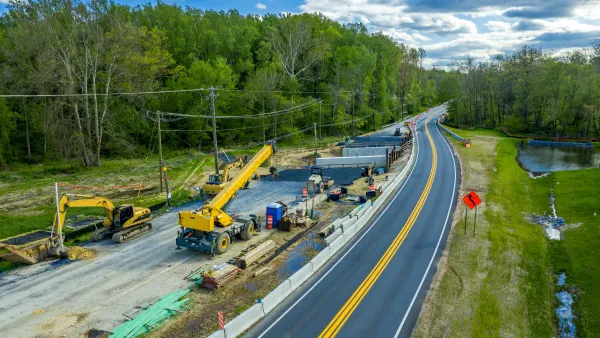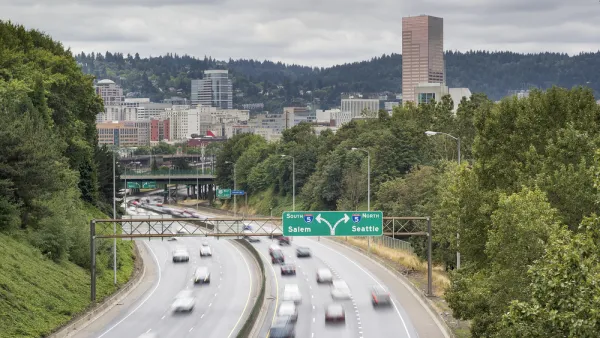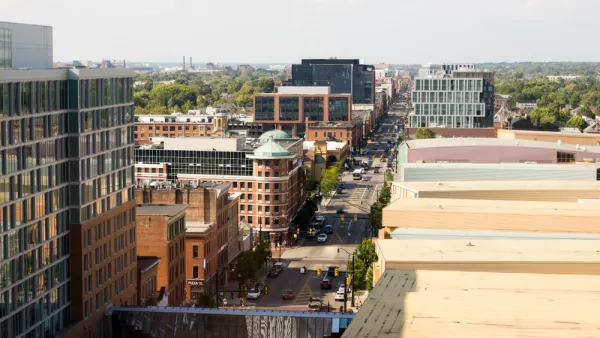In pursuit of an honest conversation about congestion, Charles Marohn produces a comparison between roads and stormwater infrastructure.
Charles Marohn takes inspiration from U.S. Senator Chris Murphy (D-Connecticut), who shared his thoughts about commuting via Twitter and a live streaming event last week.
Looking for solutions to congestion, Senator Murphy produced the following, via Twitter: "We're running our transportation system on the same amt of money as 1993. That's not going to help us with the big projects we need #FedUp."
Marohn provides a critical response of that take, which he says is straight from the Infrastructure Cult's talking point memo. Marohn counters: "Federal gas tax receipts in 1993 were $19.6 billion. By 2013, that had climbed to $29.2 billion. To this, Congress annually adds billions more. Sure, the gas tax has not been increased since 1993, but let's not pretend that is the fundamental cause of our transportation woes or -- more importantly – that what we 'need' is more 'big projects.'"
Then Marohn shifts to a description of the common stormwater system, which collects rainwater into larger and larger streams. Planners and engineers have solved the problem of the flooding often produced by such a system by addressing the flow of rainwater at the source: "We don't allow people to fill their wetlands. We require developers to retain their runoff on site. We build retention systems to hold back runoff and feed stormwater into the natural systems more slowly so flooding does not occur. We take these steps and others at the source to mitigate the cumulative, negative impacts of stormwater runoff. Namely: flooding."
The description of stormwater systems is thus compared to the road system, but in this case, planners and engineers have yet to address the source of the problem in finding solutions for congestion:
"For automobile flooding (congestion), the only way to deal with it and still have a successful economy is to address it at the source. We need to absorb those trips locally before they become a flood. Instead of building lanes, we need to be building corner stores. We need local economic ecosystems that create jobs, opportunity and destinations for people as an alternative to those they can only get to by driving."
FULL STORY: DEALING WITH CONGESTION

Analysis: Cybertruck Fatality Rate Far Exceeds That of Ford Pinto
The Tesla Cybertruck was recalled seven times last year.

National Parks Layoffs Will Cause Communities to Lose Billions
Thousands of essential park workers were laid off this week, just before the busy spring break season.

Retro-silient?: America’s First “Eco-burb,” The Woodlands Turns 50
A master-planned community north of Houston offers lessons on green infrastructure and resilient design, but falls short of its founder’s lofty affordability and walkability goals.

Test News Post 1
This is a summary

Analysis: Cybertruck Fatality Rate Far Exceeds That of Ford Pinto
The Tesla Cybertruck was recalled seven times last year.

Test News Headline 46
Test for the image on the front page.
Urban Design for Planners 1: Software Tools
This six-course series explores essential urban design concepts using open source software and equips planners with the tools they need to participate fully in the urban design process.
Planning for Universal Design
Learn the tools for implementing Universal Design in planning regulations.
EMC Planning Group, Inc.
Planetizen
Planetizen
Mpact (formerly Rail~Volution)
Great Falls Development Authority, Inc.
HUDs Office of Policy Development and Research
NYU Wagner Graduate School of Public Service




























